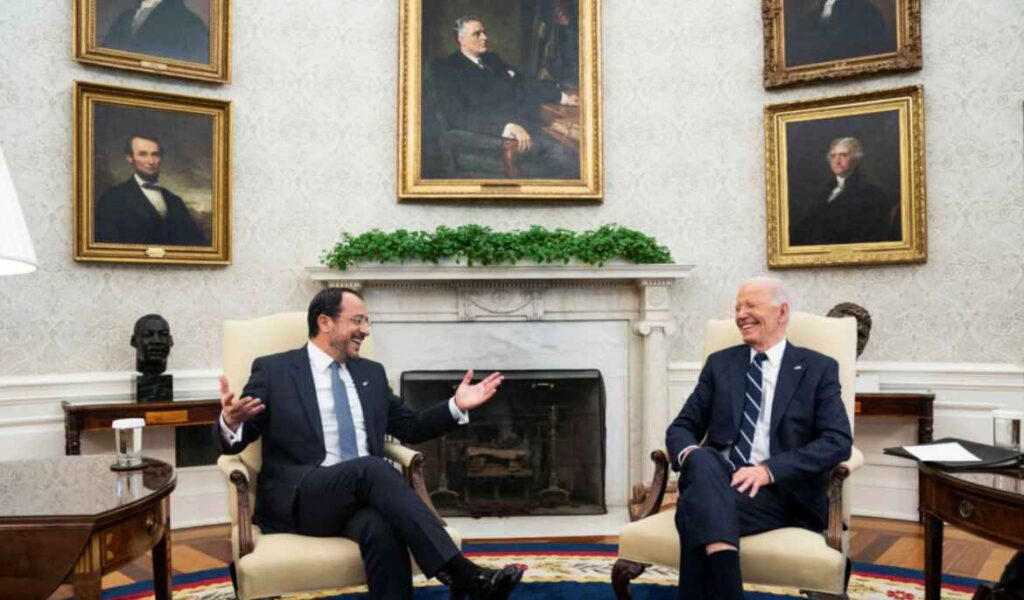The development lays the foundation for enhanced security cooperation with the incoming administration, reflects the long-term shared objective of bolstering interoperability
In a landmark decision that underscores the growing strategic depth of US-Cyprus relations, President Joe Biden issued a presidential determination, officially including the Republic of Cyprus in three critical US defense programs. This significant development opens up the way for expanded access to US defense articles – previously unavailable – lays the foundation for enhanced security cooperation with the incoming administration of Donald Trump, reflects the long-term shared objective of bolstering interoperability between the two nations, and contributes to the modernization and enhancement of Cyprus’ defense capabilities.
As part of this policy shift, Cyprus has now joined the Foreign Military Sales (FMS) program, the Excess Defense Articles (EDA) program, and US initiatives providing training and equipment to foreign national security forces. Sources in Washington emphasize that this development was deemed crucial for two reasons: to effectively address emerging challenges in the broader region and establish new security frameworks to counterbalance the formation of alliances with ambiguous or unpredictable elements; and, secondly, to firmly establish the upgraded role that the US has attributed to Cyprus in recent years, as such a development now clearly serves US security interests.
According to information obtained by Kathimerini, the process for Cyprus’ inclusion in the three programs had been under way since the fall and was finalized following Cypriot President Nikos Christodoulides’ successful visit to the White House, where the issue was also discussed.
The Foreign Military Sales (FMS) program serves as the primary mechanism for the US government to transfer defense equipment, services, and training to international partners and organizations. Eligibility is determined by the president, with the State Department responsible for approving individual cases, as seen in Cyprus’ inclusion.
The Excess Defense Articles (EDA) program enables foreign governments or international organizations to receive surplus defense items already in use by the US Armed Forces. Under the Foreign Assistance Act of 1961 and the Arms Export Control Act, defense equipment declared surplus by the Pentagon can be offered to foreign governments when deemed in alignment with US national security and foreign policy objectives, as is the case with Cyprus. Typically, surplus defense equipment is transferred to support US partners and allies in modernizing their military forces.
Additionally, Cyprus has been granted eligibility for Title 10 security assistance programs, which focus on building the capacity of foreign security forces. While Cyprus already met the criteria for certain security cooperation activities under Title 10, the presidential determination expands its participation to include Section 333 Authority to Build Capacity programs. These programs provide training and equipment aimed at strengthening the ability of foreign national security forces to conduct key operations, such as maritime and border security and counterterrorism.
Cyprus’ strategic upgrade began during Trump’s first administration, driven by then-assistant secretary of state Wess Mitchell. Mitchell envisioned and laid the groundwork for a long-term strategy in the Eastern Mediterranean, emphasizing a strong US presence and an enhanced role for both Cyprus and Greece. He also conceived and launched the preliminary steps that led to the institutionalization of the trilateral cooperation framework “3+1,” involving Greece, Israel, Cyprus and the US. These developments led to the EastMed Act, which formalized both US strategic interest in the Eastern Mediterranean and the new roles of Athens and Nicosia.
Prior to this, in 2018, a statement of intent was signed between the US and the Republic of Cyprus at the State Department by then-foreign minister Christodoulides, which, for the first time, paved the way for enhanced bilateral security cooperation.
Over the past two years, particularly since Christodoulides assumed office, US-Cyprus relations have advanced significantly. Washington’s previous concerns about Cyprus’ strategic orientation have been effectively dispelled, with centrifugal tendencies perceived as neutralized. Moreover, the collaboration between the Cypriot government and the US Department of Justice, along with the FBI – whose teams are present in Cyprus at the invitation of Christodoulides – in the joint fight against corruption and money laundering has significantly contributed to building greater trust. In this context, sources in Washington told Kathimerini that Christodoulides’ commitment and concrete efforts to restore Cyprus’ reputation have helped project the image of a modern nation with a forward-looking leadership, unburdened by past entanglements, dependencies, and alliances.
This deepening partnership has resulted in several key developments: the signing of a defense cooperation agreement in September 2024; the inaugural round of strategic dialogue held in Nicosia in October; Christodoulides’ visit to the White House; Cyprus’ inclusion in multilateral military training programs under US auspices through the 2025 defense budget (NDAA); and, on Wednesday, the presidential determination formalizing Cyprus’ participation in these three defense initiatives.
It is noted that a presidential determination in the United States is an official, legally binding directive issued by the president, often to implement specific policies or decisions regarding foreign relations, national security, or other significant matters. These determinations are typically issued under the president’s authority granted by existing laws and statutes.



